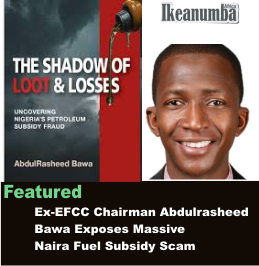Ex-EFCC Chairman Abdulrasheed Bawa Exposes Massive Multi-Trillion Naira Fuel Subsidy Scam Involving Ghost Imports, Forged Documents, and Systemic Corruption
Former Chairman of the Economic and Financial Crimes Commission (EFCC), Abdulrasheed Bawa, has delivered a bombshell exposé detailing how Nigeria’s notorious fuel subsidy fraud was carried out over the years.
In his new book, The Shadow of Loot & Losses: Uncovering Nigeria’s Petroleum Subsidy Fraud, published by CableBooks (an imprint of Cable Media & Publishing Ltd), Bawa reveals the intricate web of deceit that enabled one of Nigeria’s biggest financial scandals.
Drawing from his direct experience as a lead investigator on the EFCC’s special team that probed the 2012 fuel subsidy scam, Bawa outlines numerous fraudulent strategies including ghost importing, over-invoicing, falsified claims for fuel never brought into the country, and the manipulation of shipping documents to inflate subsidy payouts.
He also details how perpetrators exploited international price swings to claim excess payments, engaged in round-tripping, double claims, and diverted subsidized fuel to the black market or smuggled it across borders for profit.
In a statement issued by Vic Akinrogunde, Bawa described the book as a definitive exposé — combining hard evidence with insider perspective to unpack the scale and audacity of the multi-trillion naira scam. According to him, the schemes thrived due to weak oversight, forged documentation, and deep-rooted collusion between corrupt public officials and private sector players.
“The Shadow of Loot & Losses is not just a chronicle of fraud,” Bawa states. “It is a call to action — a demand for transparency, accountability, and reform in Nigeria’s public finance management, especially in the oil sector.”
Bawa, who served as EFCC chairman from 2021 to 2023, also reflects on the institutional challenges and political roadblocks in Nigeria’s fight against corruption.
Described as both revealing and thought-provoking, the book is recommended reading for policymakers, journalists, civil society groups, and all Nigerians interested in understanding and confronting the systemic corruption that undermines national development.
combination of public funding, private partnerships, and international collaborations. The government has pledged continued support to ensure the facility’s sustainability and expansion.


